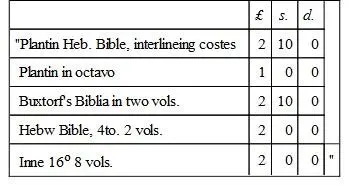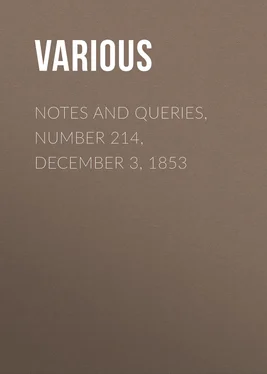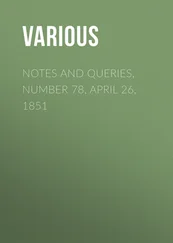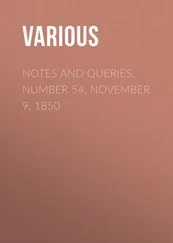Various - Notes and Queries, Number 214, December 3, 1853
Здесь есть возможность читать онлайн «Various - Notes and Queries, Number 214, December 3, 1853» — ознакомительный отрывок электронной книги совершенно бесплатно, а после прочтения отрывка купить полную версию. В некоторых случаях можно слушать аудио, скачать через торрент в формате fb2 и присутствует краткое содержание. Жанр: foreign_antique, periodic, foreign_edu, на английском языке. Описание произведения, (предисловие) а так же отзывы посетителей доступны на портале библиотеки ЛибКат.
- Название:Notes and Queries, Number 214, December 3, 1853
- Автор:
- Жанр:
- Год:неизвестен
- ISBN:нет данных
- Рейтинг книги:5 / 5. Голосов: 1
-
Избранное:Добавить в избранное
- Отзывы:
-
Ваша оценка:
- 100
- 1
- 2
- 3
- 4
- 5
Notes and Queries, Number 214, December 3, 1853: краткое содержание, описание и аннотация
Предлагаем к чтению аннотацию, описание, краткое содержание или предисловие (зависит от того, что написал сам автор книги «Notes and Queries, Number 214, December 3, 1853»). Если вы не нашли необходимую информацию о книге — напишите в комментариях, мы постараемся отыскать её.
Notes and Queries, Number 214, December 3, 1853 — читать онлайн ознакомительный отрывок
Ниже представлен текст книги, разбитый по страницам. Система сохранения места последней прочитанной страницы, позволяет с удобством читать онлайн бесплатно книгу «Notes and Queries, Number 214, December 3, 1853», без необходимости каждый раз заново искать на чём Вы остановились. Поставьте закладку, и сможете в любой момент перейти на страницу, на которой закончили чтение.
Интервал:
Закладка:
This is a reprint of the preceding form, with a scurrilous preface and observations. The prayers are given as they stand in the Royal form, but with parenthetical sentences of a most abusive character after almost every paragraph. Thus, after the clause, "Pity a despised Church," the authors add, "You mean the prelates and their hierarchy." After the next clause, "and a distracted State," they add, "made so by your wicked party." In one of the thanksgivings, after "Glory be to God," we have, "Your mock prayers defraud Him of His glory." Then, after the words "We praise thee, we bless thee," &c., from the Communion Office, we have, "Softly, lest you want breath, and thank the old Common Prayer Book for that."
Private Forms for these Sad Times. Oxford, 1645.
A Form of Thanksgiving, to be used the Seventh Day of September, thorowout the Diocese of Lincoln, and in the Jurisdiction of Westminster.
This remarkable form has no date, but it was put forth by Williams, then Bishop of Lincoln and Dean of Westminster, in the year 1641. The House of Commons had ordered a day of Thanksgiving; but they were greatly offended with Williams, on account of this form, and, instead of going to St. Margaret's Church as usual, where it was ordered to be read, they attended divine service, after their own fashion, in the chapel of Lincoln's Inn.
A Supply of Prayers for the Ships of this Kingdom that want Ministers to pray with them agreeable to the Directory, &c. London. Published by authority.
A Presbyterian form, and the only one ever published by men who decried all forms. It was put forth, as the preface admits, because the sailors clung to the Book of Common Prayer.
Prayers to be used in the Armies. 1648.
A Form of Prayer used at His Majesties Chapel at the Hague. 1650.
Prayers for those who mourn, &c. 1659.
Form of Common Prayer, to be used on the Thirtieth of January, &c. 1661.
This form differs materially from that subsequently put forth by Convocation, with the revised Prayer Book of 1662. There was also another form still earlier, in the year 1661, in which some singular and obnoxious petitions relative to Charles I. were found.
A Form of Prayer with Thanksgiving, to be used on the 29th of May, 1661.
The original edition. It differs from that which was sanctioned by Convocation and published in 1662.
Form of Prayer, &c. June 12. Fast during a Dearth. 1661.
Form, &c. Fast during a Sickness. 1661.
Form, &c. Fast, to implore a Blessing on the Naval Forces. April 5, 1665.
Form, &c. Thanksgiving for Victory by Naval Forces. July 4, 1665.
Form, &c. Fast, on occasion of the Fire of London, 1666.
Form, &c. Thanksgiving for Victories at Sea. 1666.
Form, &c. Fast. 1674.
Form, &c. Fast. 1678.
Form, &c. Fast. Dublin, 1678.
Form, &c. Fast. Dublin, 1679. To seek Reconciliation with God, and to implore Him that he would infatuate and defeat the Counsels of the Papists our Enemies. By the Lord Lieutenant.
Form, &c. Fast. 1680.
Form, &c. Thanksgiving. 1683. For the discovery of Treason.
Form, &c. Thanksgiving. 1685.
Form of Prayer with Thanksgiving for 29th May, 1685.
First edition of this reign. It was altered by the authority of the Crown.
Form of Prayer, &c. January 30, 1685.
First edition of this reign.
Form of Prayer, &c. February 6, 1685.
The accession service of James II.
A Form or Order of Thanksgiving, to be used, &c. in behalf of the King, the Queen, and the Royal Family, upon occasion of the Queen's being with Child. 1687.
This form was the occasion of much comment at the time.
A Form of Prayer with Thanksgiving, &c., for the Birth of the Prince. 1688.
A Form, &c. Fast. 1689.
A Form, &c. Fast. 1690.
A Form, &c. Fast. 1694.
A Form, &c. Fast. 1714. Thanksgiving on the Accession of George I.
Thomas Lathbury.Bristol.
Minor Notes
Chair Moving. —Recent occurrences made me look back at Glanvill's Blow at Modern Sadducism , and I observed that in his account of the "Dæmon of Tedworth," who was supposed to haunt the house of Mr. Mompesson, and who was the original of Addison's "drummer," it is stated that on the 5th November, 1662, "in the sight and presence of the company, the chairs walked about the room," p. 124.
N. B.Epitaph on Politian in the Church of the Annunciation at Florence. —
"Politianus in hoc tumulo jacet Angelus, unum
Qui caput, et linguas (res nova) tres habuit."
[The following translation of this epitaph is given in the Ency. Britannica , but it is there stated to be in St. Mark's, Florence:
"Here lies Politian, who, things strange indeed,
Had, when alive, three tongues, and but one head."]
Epitaph in Torrington Churchyard, Devon. —
"She was—my words are wanting to say what.
Think what a woman should be—she was that."
Which provoked the following reply:
"A woman should be both a wife and mother,
But Jenny Jones was neither one nor t'other."
The early Delights of Philadelphia. —In Gabriel Thomas's Description of the Settlement of Philadelphia occurs the following passage:
"In the said city are several good schools of learning for youth, for the attainment of arts and sciences, also reading and writing. Here is to be had, on any day in the week, cakes, tarts, and pies; we have also several cook-shops, both roasting and boiling, as in the city of London: happy blessings, for which we owe the highest gratitude to our plentiful Provider, the great Creator of heaven and earth."
Is not this a superb jumble?
A Leguleian.Misapplication of Terms. — Legend is a thing "to be read" ( legendum ), but it is often improperly applied to traditions and oral communications. Of this there have been some instances in "N. & Q." One has just turned up, Vol. v., p. 196.: "I send you these legends as I have heard them from the lips of my nurse, a native of the parish."
J. W. Thomas.Dewsbury.
"Plantin" Bibles in 1600. —While looking over the "Stackhouse Library" (see "N. & Q.," Vol. viii., p. 327.), I observed on the fly-leaf of an Hebrew Bible, 1600 (A. 100 in catalogue), a short MS. memorandum, which I think worth preserving. It ran as follows:
 R. C. Warde.
R. C. Warde.
Kidderminster.
Ancient Gold Collar found in Staffordshire. —It may probably interest some of your readers to know that a very ancient golden collar was lately found in the village of Stanton, Staffordshire, which is about three miles north of Ashbourne.
A labourer digging up a field, which had not been ploughed or dug up in the memory of man, turned up the collar, which, being curled up at the time, sprang up, and the labourer taking it for a snake, struck it out of his way with his spade: the next morning it was discovered not to be a snake. Unfortunately the blow had broken off a small piece at one end. The collar is now in the possession of the person with whom the curate of Stanton lodges. The description given to me is, that it is about two feet long, and formed of three pieces of gold twined together, and, with the above exception, in a very good state of preservation.
I hear that there is a similar collar in the British Museum, that was found in Ireland, but none that was found in England; and that the authorities of the Museum have been informed of this collar, but have taken no steps to obtain possession of it.
Читать дальшеИнтервал:
Закладка:
Похожие книги на «Notes and Queries, Number 214, December 3, 1853»
Представляем Вашему вниманию похожие книги на «Notes and Queries, Number 214, December 3, 1853» списком для выбора. Мы отобрали схожую по названию и смыслу литературу в надежде предоставить читателям больше вариантов отыскать новые, интересные, ещё непрочитанные произведения.
Обсуждение, отзывы о книге «Notes and Queries, Number 214, December 3, 1853» и просто собственные мнения читателей. Оставьте ваши комментарии, напишите, что Вы думаете о произведении, его смысле или главных героях. Укажите что конкретно понравилось, а что нет, и почему Вы так считаете.












